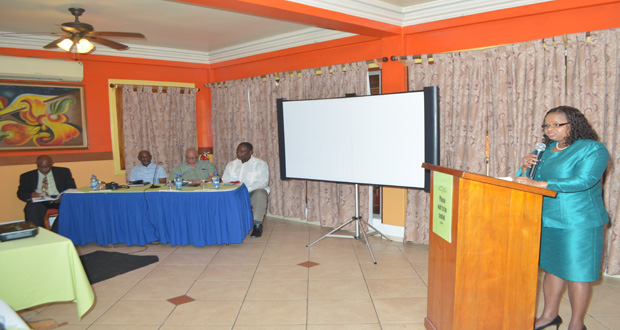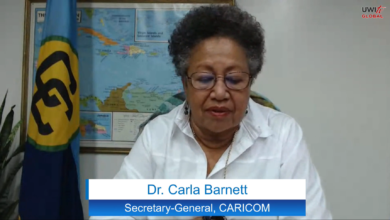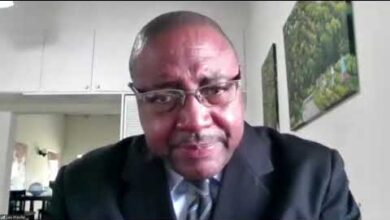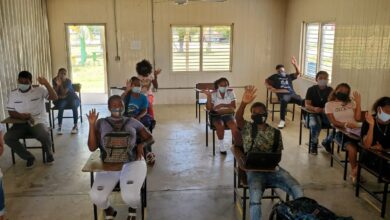By Svetlana Marshall (Guyana Chronicle)
“AS we envisage free movement of peoples, we must also address the fact that we need to protect the welfare of vulnerable groups such as non-unionised workers, workers with disabilities, youth and unskilled persons who may be exploited by unscrupulous employers,” Minister of Social Protection Volda Lawrence said yesterday as she addressed a CARICOM forum on the Free Movement Regimes of the Caribbean Community.
The two-day sensitisation forum on the CARICOM Single Market and Economy (CSME) is being conducted at the Grand Coastal Hotel and forms part of a series to be run in 12 CARICOM member states attracting the attention of the private sector, employers and trade unionists.
As CSME develops, Minister Lawrence said, undoubtedly there will be a growing number of nationals moving across borders, but emphasised the need to prevent any form of discrimination.
“The free movement of persons is a fundamental prerequisite for the effective operation of any market, so as we anticipate more movement for the future, we must entertain and seek to create the mechanisms that must be put in place to ensure that no discriminatory acts are meted out to those joining our workforce or the workforce in other member states,” she said.
Paramount in the mobility of labour is the underlying principle of respect for workers’ rights, the Social Protection Minister said, while underscoring the need for member states to commit to and ensure that workers are respected, noting that there must be fair treatment of workers without regard to nationality, socio-background or race. These principles, she said, are important in maintaining a competitive and productive regional workforce.
“One must give thought to pension and retirement benefits, and what about taxation? CSME would be challenged as the labour market is liberalised to consider the issue of contingent rights – what rights would nationals enjoy as they exercise[the] option to work in another member state.”
NOT BE SIDELINED
Additionally, she underscored the importance of putting the less developed member states high on the agenda. Minister Lawrence said as the free movement of labour intensifies, the under-developed and developing states should not be side-lined.
“… there must be a process of catching-up, so that there is not a polarised market in which some member states attain the greatest level of development to the sustained detriment of the less developed,” she explained.
“I also see the need for the trade unions to regroup and seize the opportunity to develop initiatives which will seek to modernise their structure, organisation and recruitment strategies, so that they can play a more vital role for the labour movement in the creation and effective functioning of CSME. In fact, they can help to shape workers’ attitudes to CSME, for its success depends on it being embraced positively by the workforce,” the Social Protection Minister added, while positing that there is need for a strong labour movement that will contribute to the modernisation of Caribbean society.
Zooming in on Guyana, the Social Protection Minister said Guyana is committed to the development of CSME. According to statistics, Guyana welcomed, from the outset up to November 2015, a grand total of 4890 persons – 2057 male and 2833 females. Of this number, 3372 were graduates, 487 non-graduates which included musicians, artistes, sports persons and media persons, 75 nurses and 182 trained teachers. It was further pointed out that 774 certificates were accessed.
In addition to Minister Lawrence, the Minister within the Ministry of Social Protection, Keith Scott, General Secretary of the Guyana Trades Union Congress, Lincoln Lewis, and President of the Private Sector Commission (PSC), Norman McLean, were among the officials present at the forum.
ENCOURAGED
Lewis said the labour movement is encouraged by the efforts made by CARICOM to realise a common space for citizens of the Region, but he said the CSME cannot be realised by only putting laws in place. He said emphasis must be placed on the people.
“We need to take the discussions in the alleyways and the byways,” he posited.
According to him, the movement has to be guided and developed by basic internal arrangements that have the inputs of the people of the Region.
“Tremendous work has been put in place by the technicians, but we have lacked over time the political will to make sure that what has been developed has been implemented. As such, the pace is slow.”
“Today, we speak of a green economy, a green economy is driven by laws, rules and conventions; conventions that speak to no child labour, no forced labour, freedom of association,the right to collective bargaining [and] better services… It is within that context that whatever is being written and applied, it has to respect the fundamental rights of citizens of this Region.”







